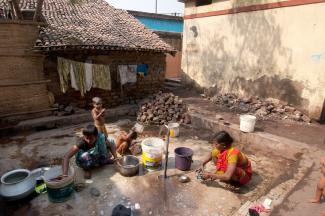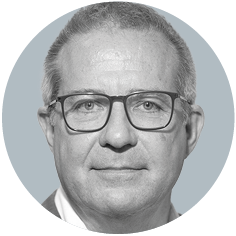Strategies
Beyond aid – new ways forward?
 Heldur Netocny/Lineair
Heldur Netocny/Lineair
Conventional development issues still need to be addressed, as goals like the eradication of poverty have not been achieved. At the same time, the development landscape is changing radically. Over the past few decades, the number of aid receiving countries has sharply decreased. By 2030, it is estimated that another 28 countries with an aggregate population of 2 billion will no longer be eligible for official development assistance (ODA).
Other fundamental features are also changing. Aid no longer serves only to reduce poverty; it is also used to tackle challenges such as climate change, inequality and insecurity. As early as 2009, this state of affairs prompted Severino and Ray to speak of "The end of ODA".
The discussion on realigning development cooperation has only intensified since. In the narrow sense, we understand “development cooperation” as the transfer of public resources (funds, advice, et cetera) from wealthier to poorer countries.
What is “beyond aid”?
The “beyond aid” debate is quite diverse. It is about any actual or apparent reform in this policy area. Nonetheless, some dimensions have become obvious. “Beyond aid” is an umbrella term for the transformation of official development assistance and its decline in relative importance. The transformation is specifically evident regarding actors, finance, regulation and knowledge.
- Actors: The number and diversity of actors cooperating with developing countries has long ago expanded beyond bi- and multilateral aid agencies. Additional actors include emerging-market nations that engage in South-South cooperation. Moreover, the line ministries of many countries have begun to deal directly with one another in areas such as health, energy or science, often bypassing established cooperation agencies. Additionally, sub-national actors such as cities network with counterparts in developing countries. At the same time, the range of private actors is broadening: companies, non-governmental organisations and church-based and philanthropic agencies such as the Bill and Melinda Gates Foundation are increasingly assertive.
- Finance: The relevance of ODA is diminishing in many countries in relation to other forms of development finance. Even in poor developing countries, domestic resources are the main source of public investments, but financial assistance remains essential for some of the poorest countries. Private international financial flows (e. g. foreign direct investment or migrants' remittances) become ever more important however. Moreover, innovative financing mechanisms make it more attractive to use private funding for development purposes. Such mechanisms include global public-private partnerships on topics such as health or climate change. To tackle global challenges, there is a role for innovative sources of finance such as carbon emission certificates and transnational taxes.
- Regulation: Policy coherence for development advocates development-friendly policies across all government departments in donor countries. No policy, whether in the fields of agriculture or trade, should block international development. Rather, all policies should promote this cause. This imperative remains important, but the conditions are changing. The established development agencies are no longer the only ones to demand coherence in pursuit of their specific goals, and there is a growing probability of conflicting development goals (balancing, for instance, poverty reduction with climate-change mitigation). Ever more differentiation among developing countries, moreover, raises additional questions of which governments can do most to improve coherence. A growing number of developing countries – especially the more dynamic ones – need to become involved in efforts to improve policy coherence and drive development.
- Knowledge: Whether the focus is on updating farming methods, improving public finance or taking action to mitigate climate change, knowledge is key to development. The transfer of knowledge is likely to become increasingly dissociated from financial transfers and technical advice. Knowledge to drive the new development agenda and to meet partner countries' differentiated needs is becoming more and more specialised and is generated by many institutions that are outside the realm of development cooperation. The challenge is to identify and share that knowledge and apply it to specific contexts. Development measures should continue to play a key role in this process, but they will face more competition in doing so. Knowledge intermediaries may even become redundant in relations with more advanced developing countries. Many developing countries are certainly able to organise knowledge transfer and generate knowledge themselves.
Change as a learning process
The four dimensions discussed above prove that governmental development agencies lost any existing claim to lead development. Now more than ever, many relevant areas are beyond their immediate influence.
Other actors from the private and public sectors have always played a role even in conventional development matters such as the basic needs, nutrition and health. Today, however, the dramatic differentiation among developing countries and the increased diversity of problems lend urgency to “beyond aid”. The pressure to change has never been more intense. The established development agencies need to engage in a learning process to redefine goals, instruments and, ultimately, the entire policy field.
The Millennium Development Goals (MDGs) created a relatively simple framework for development cooperation: poverty reduction in developing countries was to be supported mainly by money from industrialised countries. Except in the case of MDG 8, the goal of creating a global partnership for development, “beyond aid” did not figure prominently on the agenda.
Today, the process for realigning global development goals and instruments is well underway. The post-2015 agenda is clearly set to have a wider horizon than the MDGs. It is also clear that broad goals such as inclusive development, environmental sustainability, and peace and security cannot be achieved solely through the provision of ODA.
There are now two ways forward for development cooperation. The simple solution is to expand methods and measures in pursuit of existing goals. The more ambitious and promising alternative, however, is to embrace a complex learning process that would lead not only to an expansion of the means, but just as much to a redefinition of the ends.
Two models: specialisation and integration
In the first model, development cooperation would focus on the steadily shrinking group of poor countries. Poverty reduction would remain the primary goal. While this goal can only be achieved with local resources and good governance, ODA continues to make an important external contribution. The poorest countries, which tend to suffer from fragile statehood too, remain highly dependent on this money. Nonetheless, “beyond aid” challenges would require attention even in this model. Fragile statehood, for instance, cannot be reduced regardless of international security affairs.
In the second model, development cooperation would become part of international cooperation in general. It would help to address challenges that many countries have in common. Such challenges include rapid urbanisation, demographic change and the provision of global public goods such as the protection of the climate, biodiversity, food security and the prevention of pandemics.
Poverty reduction would remain a major goal in this scenario, but it would no longer be the main focus. Moreover, distinguishing "developed" from "developing" countries would no longer be crucial. On the contrary, policies would concern not only fragile and conflict-torn states, but middle- and high-income countries as well. Development cooperation would thus contribute to collective action at the global level.
The two models – specialisation and global integration – are not mutually exclusive. Rather, they correspond to existing trends that will shape the future alignment of development cooperation. Both scenarios present new challenges. In the case of specialisation in cooperation with poor countries, it is unclear to what extent aid agencies would be capable of cooperating with all the other actors they need to achieve their goals. Why, for instance, should European trade policy take a back seat to development policy? The global integration scenario certainly offers more potential for harnessing synergies, but it requires much more mutual openness. New conflicts of interests would be likely to emerge.
Whichever direction development cooperation takes, its significance at global level will change. As a specialised policy field, it would retain a high degree of autonomy within its own sphere, but it would have little influence beyond it. As part of a more general global cooperation effort, it would become more relevant in addressing global challenges, but it would have to accept a smaller role next to other policy areas.
Beyond aid: What would be different?
Finally, there is the question of how thinking about “beyond aid” would impact on development cooperation in practice. At the beginning of 2014, the importance of discussing this issue was stressed by Ralf Schröder, a head of division at Germany's Federal Ministry for Economic Cooperation and Development. He contended that the importance of classical development cooperation was waning.
Indeed, “beyond aid” does have a direct bearing on important matters. The following two examples serve to illustrate the fact:
- Whether development agencies specialise in poverty-related issues or become integrated in the broader system of global cooperation is fundamentally relevant for the future of development cooperation as a policy field. The UK, for example, recently ended cooperation with India and South Africa as the result of a specialisation strategy. The alternative would be to continue cooperation with emerging economies to address challenges like climate change or education.
- There are implications for the distribution of ODA funds. At present, the money flows predominantly to countries and regions. This approach would be reinforced by specialisation. The global-integration approach to development cooperation would alter the pattern however. Funds would be distributed regardless of national and regional boundaries, deployed for maximum impact in tackling global challenges. New questions would arise: Where can poverty be addressed most successfully? Where does climate change mitigation work best?
How development policy makers and their agencies respond to the changing global landscape will have huge consequences for their operations. There is no way to escape the fundamental “beyond aid” debate in the near future.
Stephan Klingebiel is head of the Bi- and Multilateral Development Policy Department at German Development Institute/Deutsches Institut für Entwicklungspolitik (DIE).
stephan.klingebiel@die-gdi.de
Sebastian Paulo is a researcher in the same DIE department.
sebastian.paulo@die-gdi.de
Heiner Janus is also a researcher there.
heiner.janus@die-gdi.de

